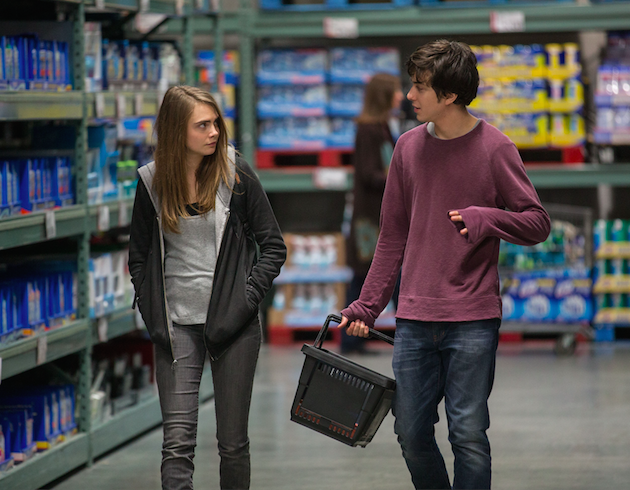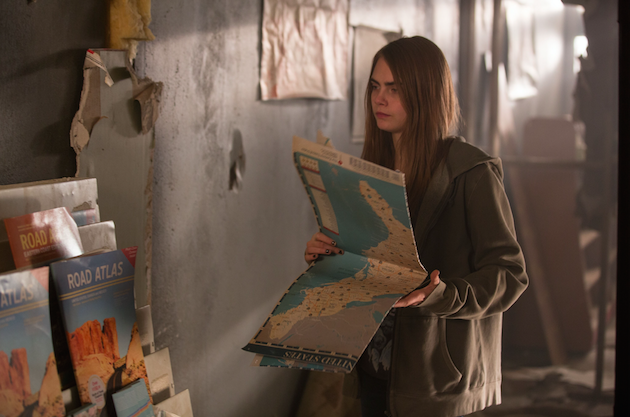Paper Towns Screenwriters Scott Neustadter and Michael Weber
When I originally met screenwriter Michael Weber, he was doing publicity for a small-budget 2013 film entitled The Spectacular Now that he co-scripted with his writing partner, Scott Neustadter. That film, which had been languishing in development for years, went on to receive critical acclaim and helped shoot its two stars— Miles Teller and Shailene Woodley— into superstardom.
Weber and Neustadter earned raves for that successful adaption of Tim Tharp’s novel. Although they had been a screenwriting team for over a decade and had penned the wonderful 2009 hit (500) Days of Summer, The Spectacular Now was their first big adaptation and despite the years of waiting and the geographic distance that stood between them (Weber lives in New York while Neustadter resides on the West Coast), the film’s success proved how creatively in sync they were.
In 2014, they went on to adapt their biggest story yet: John Green’s bestselling novel The Fault in our Stars. That film, which was highly anticipated by millions of readers and even set a record for trailer views on YouTube, went on to score at the box office, earning more than a hundred million dollars domestically. It also established a strong relationship between the screenwriting duo and Green.
Today, Weber and Neustadter’s second adaptation of a Green novel will be hitting the big screen. Paper Towns stars Fault co-star Nat Wolff and tells the story of a young man named Quentin (Q, for short) who is on a quest to find Margo (Cara Delevingne), his enigmatic neighbor who has gone missing.
I recently had the opportunity to talk to Weber and Neustadter about their new film, their disagreements as co-writers and how they related to the source material. Below is a slightly edited transcript of our conversation.
You were hired for this film before The Fault in our Stars was released. Were you nervous about making a commitment to another John Green adaptation before you saw the results of Fault?
Weber: We felt good about the process we’d gone through on The Fault in our Stars. It would be a lot of the same team for Paper Towns. That was exciting to us. We had a great rapport with John Green at that point and best of all, they were building the movie around Nat Wolff who we loved working with on Fault and obviously the perfect choice to play Q. We'd seen Fault but it was not out yet. We felt pretty good about the team they were putting together for Paper Towns.

Lots of time when you’re writing an adaptation, you don’t usually know the actors you’re writing for. Did knowing Nat and his voice change your process at all?
Weber: No, I don’t think so. Paper Towns in some ways was the most difficult adaptation we’ve ever tackled, but the fact that it was Nat who can do it all— he’s hilarious but he can also do these more emotional moments— made it easier. We didn’t have to worry ‘will an actor be able to nail that range’ cause we know Nat can do all those things and more.
How was this process different than adapting The Fault in our Stars?
Neustadter: I think we always work the same way regardless of the project. We’ve been doing it since 2000 but we’ve been seriously doing it since 2006, which is still a long time. We always start from the place of being fans of the novel and wanting to figure out how to make the best movie out of that book, and with Fault in our Stars, it was really simple. That novel is very cinematic on the page. It reads like a perfectly structured screenplay in a lot of ways. Paper Towns was very different. Weber alluded to how difficult an adaptation it was. Mostly, that’s because the book is not at all structured in a normal cinematic fashion. It’s really kind of a unique style and it changes in tone in every chapter. It’s really all over the place in an interesting way but when it’s a movie, you’ve gotta kinda find its spine.
Michael, a few years ago you and I talked about John Hughes movies and how a lot of them set the standard for films about young people today, but few of them have the mystery element that Paper Towns has, so I’m wondering if there were any other films you looked to for inspiration on how to tackle the mystery element here.
Weber: Off the top of my head, I can’t think of any films about young people that had that element. I will say that the book had a larger sense of danger. It wasn’t just a mystery. It was ‘Is Margo alive?’ Something terrible happened to her and that’s something we downplayed for our adaptation partly because it didn’t feel like part of the spine of the movie we wanted to tell, and also, it just raised a lot of other questions: Where are the parents? What are the cops doing? The kind of things we didn’t want to get bogged down in.
Neustadter: The big thing that we did is we turned the mystery into a quest. We’re traveling with him. We’re seeing this through his eyes and what he knows is that someone is asking him to come find them, and so we’re kinda on this journey with him to not solve a mystery as much as win the prize. And that was kind’ve an important change. A lot of coming of age stories are quests, and we ran with that.

Can you talk about your writing process itself?
Neustadter: I think the process is pretty much the same whether it’s an adaptation or an original script for us. There’s a lot of conversation in the beginning about what we want to do, what we want to say, who the main characters are, and our email chains turn into blueprints for the story. When it’s an adaptation, we both read the source material. We’ve highlighted the text and we know what we want to try to include. When it’s an original script, the process is that we outline specifics and then we literally divide up scenes. You take numbers one through five. I take six through ten. We go back and forth with them. We consult our own individual text that we’ve highlighted and we say, “Oh, you didn’t use this line in this scene that I love. ‘Why didn’t you do this’ and that is how we’ve always worked.
When you send each other different scenes, are you commenting on them or editing them?
Weber: If one of us feels that something is missing in the outline from the book, it’s a conversation over phone or over e-mail. We try to do as many of those as possible before we start writing…it’s always easier to solve problems when we’re looking at 6 or 8 pages of an outline than to be 60 to 80 pages into a script and realize ‘Oh shit, we need to go back and fix something that’s gonna impact everything that was written so far.’
You two have been working together for a long time so I’m curious: what is the biggest source of disagreement you’ve had?
Weber: I don’t remember any big disagreements on Paper Towns.
Neustadter: There are various minutiae. A disagreement [on this film] would be ‘Can we move the prom to the end instead of in the middle?’
Weber: Except we didn’t disagree on that. We were both so in favor of that that we just had to convince everyone else.
Neustadter: Weber and I are usually in lockstep. We don’t tend to disagree but in order to make some changes to Paper Towns, we had to sort of run it by John (Green) and say to him ‘is this okay to you?’ and ‘would it be okay with your fans?’ He’s very in touch with his fans and what they want and what they can accept if something changes from book to film, and we always want to consult with him and say ‘how upset are people gonna be if we do this thing as opposed to that thing.’
Weber: It was really nice. We had our premiere and John said to me, ‘I think all of the most well-received stuff in the movie was you guys.’ That’s not true but it was very nice for him to say. I don’t think Paper Towns could’ve been our first collaboration with John. In some ways, we needed to have Fault where we had lines of communication already open and trust and a rapport there so that John would let us make changes on the page. If we had not done Fault with him already, I’m not sure we would’ve had that leeway, so we’re certainly glad things turned out the way they did.
When you write an elusive character like Margo — who is so many different things to so many different people in the story — how do you find the real her?
Neustadter: It would be wrong for anyone to put her in a box of, ‘Hey, this is what she is and this is who she is.’ It’s not really her story. This is mostly Q’s journey and his discovery at the end that what he thought about this person was not true. We end the movie on this really nice idea of, ‘I’m not gonna do that anymore and if you want to know who she is, you’ve gotta hear her story.’
Michael, when we talked about Spectacular Now, you talked about bringing elements from your own past relationships or your own personality into the story. What experiences of yours did you bring to this adaptation?
Weber: The thing we try to do in everything we write is really lean on the idea of ‘What would really happen,’ and so when we’re measuring what to use from the book and then what to massage into something new, we’re constantly asking ourselves and each other, ‘What would really happen.’ I think there’s obviously — consciously or otherwise — parts of who we are and what we’ve been through in everything. I’m a little hard pressed to think of specifics because the job was really about taking this book that was rather tricky and finding a way to make it a coherent movie narrative.
Neustadter: I can think of one. The whole idea of somebody who will risk everything to go after a girl who may not actually be interested in him is certainly something I certainly did my entire childhood—
Weber: I wanted to do that.
Neustadter: I was that histrionic kind of kid. We were actually concerned when we were thinking about doing this (film) whether or not it was too close to (500) Days of Summer because that’s about a character who does the exact same thing. Someone who’s so convinced that the answers to life’s problems lie in getting the girl. I can speak to that because it was a problem for me for a really long time.
It’s not a problem anymore?
Neustadter: It is definitely not. I know where the answers are. They’re within, as the movie scholars will tell you.
Featured image: Longtime neighbors Margo (Cara Delevinge) and Quentin (Nat Wolff) reconnect. Photo by Michael Tackett. Courtesy 20th Century Fox.



